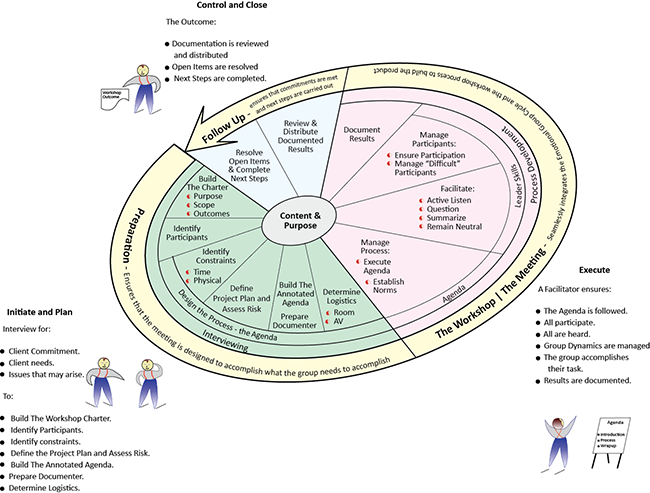September 2015 - The FoCuSeD™ Facilitator eNewsletter

Why Structured Facilitation is Crucial | Gary Rush Facilitation
Have you ever been in a workshop or meeting when someone “brainstormed” and ended up developing a useless list? How about a meeting to solve a problem and, when done, the pieces didn’t fit together? That’s why Structured Facilitation is crucial.
People skills are absolutely necessary. The group must be able to work together and form a team. However, the group must also build something of value. That requires a thought process – structured facilitation skills. That thought process must be built into the workshop or meeting agenda – it’s not a separate element. It is crucial, i.e., brainstorming requires a structured thought process to build something of value. Workshops or meetings with little or no process do not succeed – even when the group is working well. Facilitators who do not know or understand “how to” create structured agendas tend to rely on the group for guidance. Unstructured facilitation techniques often take away from the Facilitator’s role allowing for rambling discussion instead of following a structured process to get to the end result. Groups don’t know, they need guidance – that’s why they hire a Facilitator. The Facilitator must be skilled at taking a particular task and developing a thought process to accomplish the task. Note: A thought process is not a procedure – it is a thinking process that takes people from point A to Z in making decisions, solving problems, etc.
The following examples illustrate the difference between a strategic planning agenda that has no defined thought process and one that has a defined thought process.
Has no defined thought process:
Agenda
- Introductions
- Define Strategic Plans
- Brainstorm Deliverables
- Build each Deliverable
- Identify Next Steps
- Wrap up
Has a defined thought process:
Agenda
- Introductions
- Define your Mission
- Identify Values
- Define the Vision
- Describe Objectives
- Define the Current Environment
- Identify Strategies to reach Objectives
- Describe the Critical Success Factors
- Define Next Steps
- Review and Wrap Up
The first agenda leaves everything up to the participants, leading to poor decisions. The second agenda defines the elements of a strategic plan and walks the participants through the process enabling good decisions. The second agenda will be successful because it is well thought out. Ask yourself, “Would I rather attend a workshop or meeting with the first agenda or the second?”
Building agendas that provide the right structured thought process is not easy. It requires an understanding of the appropriate methodology – not expertise level, but an overall understanding of the underlying method along with thought processes to help, such as decision-making. The basis of every successful workshop or meeting is a well-defined structured process. The Facilitator must also know “how to” make the underlying method into a thought process that is understandable to the participants – who often don’t know the method themselves.
The process of selecting the underlying method then converting it into an agenda is part of the preparation phase. It requires interviewing participants. Once the information is gathered, the Facilitator modifies the method – changing complex or unfamiliar terms (e.g., entity, normalize, etc.) and modifying steps that participants cannot do (e.g., a group of people cannot collectively write a paragraph, deal with complex matrices, etc.). After the agenda is developed, the Facilitator reviews it with the participants and client to ensure that it is clear and produces the desired outcome. A well-trained Facilitator then develops a detailed script or annotated agenda that details step-by-step how the process will produce the desired outcome. This annotated agenda guides the Facilitator when facilitating the workshop or meeting to accomplish the task. Note: Avoid Facilitators who do not use an annotated agenda – they are “winging it.”
Every agenda is a modified version of an accepted method (thought process) – modified so that the Facilitator can step participants, who do not need to know the method, through the workshop or meeting to gather the information required. Being able to build the required structured process is the responsibility of the Facilitator and knowing “how to” build that structured process is half the skills-set required of a Facilitator. Workshops or meetings without a clear structured process fail. Those with a clearly defined structured process succeed. ![]()
Why FoCuSeD™ Facilitator Training
In The FoCuSeD™ Facilitator Academy, we spend two days getting students to understand and practice people skills, group dynamics, problem people, creativity, etc. We then spend two days helping them learn “how to” design an agenda and “how to” structure a workshop – it requires equal time. We teach a well-defined method that guides the Facilitator through the steps necessary to design an effective structured process that will guide the participants to their desired outcome. We share our “cookbook” processes, e.g., strategic planning, analysis, modeling, decision-making, etc. These “cookbook” processes give students a starting point and they can be springboards for individual customization. Our goal is to enable Facilitators to design and facilitate a clear, well-defined structured process along with enabling them to deal with people and groups.
Be wary of Facilitator training that skips teaching structured processes or techniques that provide a set of standard processes but no flexibility to develop new processes. Every workshop or meeting is different and every agenda must be custom designed for that specific workshop or meeting. Facilitators need to be flexible and able to design new processes.
We offer The FoCuSeD™ Facilitator Academy, our 4-day flagship facilitator class providing state-of-the-art in Structured Facilitation Methodology, publicly and on-site anywhere in the world. Please contact Gary Rush, IAF CPF for availability and pricing.

